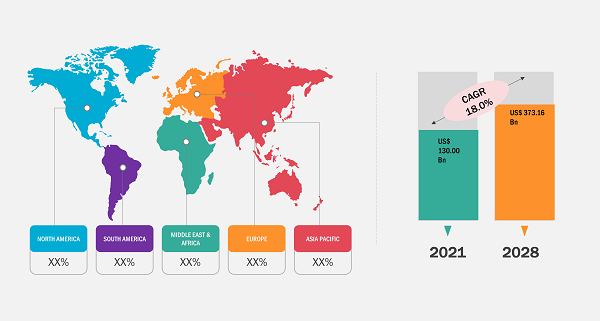Rise in Engineering Innovation is Catalyzing Autonomous Vehicle Market
According to our latest market study on "Autonomous Vehicle Market Forecast to 2028 – COVID-19 Impact and Global Analysis – by autonomy level, and application," the market is expected to grow from US$ 130.00 billion in 2021 to US$ 373.16 billion by 2028 with an estimated CAGR of 18.0% from 2022 to 2028.

Autonomous Vehicle Market Report, Analysis, Opportunities by 2031
Download Free SampleAutonomous Vehicle Market Size and Forecasts (2021 - 2031), Global and Regional Share, Trends, and Growth Opportunity Analysis Report Coverage:by Autonomy Level (Level-3, Level-4, Level-5); Application (Consumer, Robo Taxi, Self-driving Bus, Ride Hail, Ride Share) , and Geography (North America, Europe, Asia Pacific, and South and Central America)
Source: The Insight Partners Analysis
Automotive innovation is augmenting the growth of the mobility and transportation sectors. Automakers are designing and developing safe, efficient, and convenient autonomous vehicles by including cloud computing, edge computing, electrification, and autonomous driving systems, among others. Autonomous vehicles are designed to perceive the vehicle’s surroundings and determine precise localization by detecting and measuring the distance to objects in its vicinity. To achieve this, autonomous vehicles employ a combination of sensing and perception systems, such as vision systems, radar, and LiDAR sensors. Innovative sensing technologies can be integrated with different components equipped in the vehicles to produce very high-resolution mapping of objects. LiDARs are anticipated to witness a significant growth in the autonomous vehicles market due to the abilities of detecting reflected light energy and calculating the distance to the object. Many autonomous vehicles are using scanning LiDAR systems with a rotating mirror assembly to direct the laser pulse. Further, the advancement of innovative technologies, automotive technical intelligence, and intellectual-property management is enabling auto manufacturers to identify additional revenue streams. Thus, the growing deployment of autonomous vehicles with high-fidelity multiphysics simulation solution from the component to the system to ensure driver and pedestrian safety is propelling the growth of the autonomous vehicle market.
Engineering innovation is assisting autonomous vehicle makers to understand the intellectual property and technology strengths of their competitors and enable differentiation. Countries across the world are adopting advanced engineering solutions such as objective third-party analysis at component, circuit, and system levels and are also understanding components’ underlying cost structure that can assist them in price negotiations. Extensive R&D and partnerships and collaborations with industry experts is anticipated to boost the global autonomous vehicle market growth.
The global autonomous vehicle market is segmented into component, mobility type, and electric vehicle type. Based on component, the market is segmented as camera unit, LiDAR, radar sensor, ultrasonic sensor, and infrared sensor. By mobility type, the market is segmented as shared mobility and personal mobility. In terms of electric vehicle type, the market is segmented as battery electric vehicles (BEV), hybrid electric vehicles (HEV), plug-in hybrid electric vehicle (PHEV), and fuel cell electric vehicle (FCEV).
Audi AG; BMW AG; Daimler AG; Ford Motor Company; General Motors Company; Google LLC; Honda Motor Co., Ltd.; Nissan Motor Company; Tesla; and Toyota Motor Corporation are the key autonomous vehicle market players profiled during the study. Several other major companies were studied and analyzed during this research study to get a holistic view of the autonomous vehicle market and its ecosystem.
Contact Us
Phone: +1-646-491-9876
Email Id: sales@theinsightpartners.com